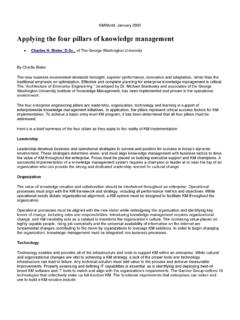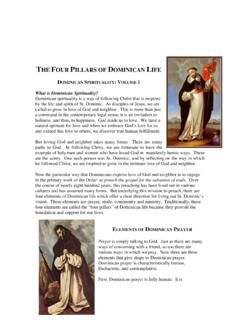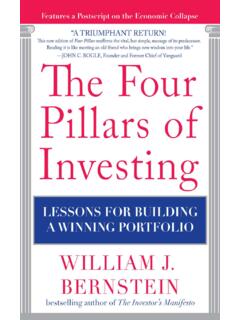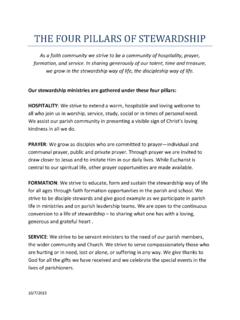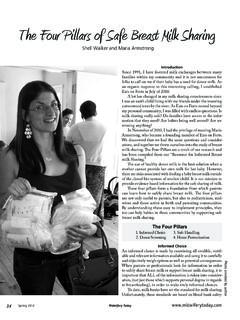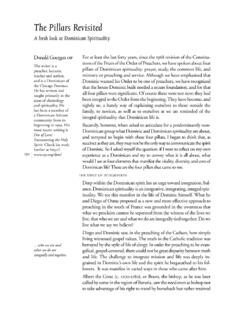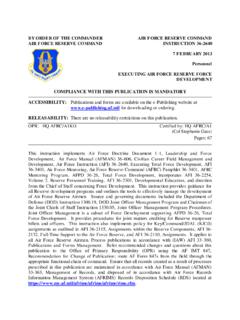Transcription of THE FOUR PILLARS OF CHRISTIANITY
1 THE four PILLARS OF CHRISTIANITY : Essential Knowledge for Every Christian Wade Smith, PhD Kevin McKee, D. Min. This book is in pre-publishing form. Please do not edit or share without authors permission. Many thanks! Wade Kevin Table of Contents Foreword CHAPTER 1: FRAMING THE ISSUES Who are we? Internal conversations Objectives and applications A rude awakening Two decidedly different stories: Connecting the head and the heart Kevin s story Wade s story The search begins The search shared The challenge The head And the heart What does this mean to the church? CHAPTER 2: THE BIG PICTURE: Why is there anything at all? Ultimate questions, ultimate answers? Recognizing an important shift Reacting to an increasingly skeptical worldview Does science disprove God? Unpacking the problem: How did the universe get here?
2 Evidence for a Creator? The multiverse? A review of the options and a conclusion based on the evidence Laying the Age of the earth? Conclusion CHAPTER 3: IS JESUS DIVINE? On the road to Emmaus Just what is a Messiah anyway? Beginning with Moses and the prophets? If this was a conspiracy it was a whopper Jesus never claimed to be divine? Jesus did not view himself as divine? What happened? Summary CHAPTER 4: RESURRECTION The beliefs of a second temple Jew regarding resurrection What was the messiah expected to do? Building the case for the resurrection What we know There was an empty tomb There were multiple post-resurrection reports of Jesus being alive Women were the first eye-witnesses to the resurrection There were other appearances The empty tomb and the resurrection are inextricably linked Bewildered disciples were transformed into emboldened witnesses Example 1: Peter Example 2: James, the half-brother of Jesus Example 3: Paul From terrorist to apostle Saul or Paul?
3 Maybe all these stories are concoctions written well after the fact? Dating Acts (and the Gospels) Reason 1: Details that would not be expected if Acts were written well after the events occurred Reason 2: Paul and Peter are still alive in Acts Reason 3: Luke was written before Acts Reason 4: Luke appears to have used Mark as a source Reason 5: You cannot make up stories of this magnitude this close to the actual event Reconciling the Gospels as Independent Sources Reason 6: Resurrection becomes THE POINT of CHRISTIANITY How else to explain all of this? CHAPTER 5: WHAT ABOUT SUFFERING? HOW CAN EVIL EXIST IF GOD IS ALL-LOVING AND ALL-POWERFUL? What is the source of evil? James, Paul, Job and Jesus: Examples of how to deal with evil James Paul Job The Gethsemane prayer Why is suffering so common?
4 Sovereignty of God and free will of man What about the person who never hears the good news? One more word Why we can trust a sovereign God The final Passover CHAPTER 6: PREPARED TO GIVE AN ACCOUNT FOR THE HOPE THAT YOU HAVE Answering rational objections from the skeptic: Case 1 Answering the skeptic s argument of pain and suffering: Case 2 CHAPTER 7: A CALL TO ACTION FOR CHURCHES Every church should provide members with an adequate base of foundational knowledge The future church i Foreword Perhaps as many as 10,000 churches have closed their doors in recent years and upwards to 80 percent of the formerly churched indicate a weak belief in God. A common response from those who have left the church is they could not get their questions answered in a safe environment. And, to throw one more rock on the pile, between 2010 and 2012, more than 50% of the churches added not one new ,2,3 Facts like these point to the inescapable conclusion that the influence of the church upon modern culture is Small groups and well-honed praise teams will not change these trends because they are all geared towards folks who are already in church.
5 Even well-done sermons that address spiritual growth will likely be insufficient since the foundations for those sermons are lost on many a skeptic. If the church in America is to re-invigorate itself, we believe it will be necessary to reclaim the high ground for the intellectual defense of our beliefs. Consider the thoughts provided below: Modern culture is a tremendous force. It impacts all classes of society. It affects the ignorant as well as the learned. What is to be done about it? In the first place the church may simply withdraw from the conflict. She may simply allow the mighty stream of modern thought to flow by unheeded and do her work merely in the back eddies of the current. There are still some men in the world who have been unaffected by modern culture. They may still be won for Christ without intellectual labor. And they must be won. It is useful, it is necessary work. If the church is satisfied with that alone, let her give up the scientific education of her ministry.
6 Let her assume the truth of her message and learn simply how it can be applied to modern industrial and social conditions. Let her give up the laborious study of Greek and Hebrew. Let her abandon the scientific study of history to the men of the world. In a day of increased scientific interest, let the Church go on becoming less scientific. In a day of increased specialization, of renewed interest in philology and in history, of more rigorous scientific method, let the Church go on abandoning her Bible to her enemies. They will study it scientifically, rest assured, if the Church does not. Let her substitute sociology altogether for Hebrew, practical experiences for the proof of the gospel. Let her shorten the preparation of her ministry, let her permit it to be interrupted more and more by premature practical activity. By doing so she will win a straggler here and there. But her winnings will be but temporary. The great current of modern culture will engulf her puny eddy.
7 God will save her ii somehow out of the depths. But the labor of centuries will have been swept away. God grant that the church may not resign herself to that. The article goes on to say: During the last thirty years there has been a tremendous defection from the Christian Church. It is evidenced even by things that lie on the surface. For example, by the decline in church attendance and in Sabbath observance and in the number of candidates for the ministry. Special explanations, it is true, are sometimes given for these discouraging tendencies. But why should we deceive ourselves, why comfort ourselves by palliative explanations? Let us face the facts. The falling off in church attendance, the neglect of Sabbath observance these things are simply surface indications of a decline in the power of CHRISTIANITY . CHRISTIANITY is exerting a far less powerful direct influence in the civilized world today than it was exerting thirty years If you did not do so the first time, reread the above excerpts carefully.
8 They provide a compelling analysis of the Church and its place in society today, except the words were written in 1913 by J. Gresham Machen for the Princeton Theological Review (Vol. 11). The words may be over a century old but the thoughts succinctly crystallize the position the Church finds itself in today. Increasingly, we find ourselves in a culture that, at its heart, is hell-bent on marginalizing the Church, minimizing its relevance until it and its worldview are tossed on the trash heap of similarly discredited beliefs. There is a battle raging to establish and maintain the high ground of truth and the Church cannot afford to hold back anything that supports its position. This book is an effort to equip the Church to effectively answer a culture that grows increasingly hostile to its claims. The Church must be able to defend its core beliefs and accordingly its core behaviors. The core beliefs we refer to here are straightforward: A) The existence of the God of the Bible, B) Jesus is the divine son of God, C) Jesus resurrected from the grave, and D) The Christian perspective on suffering and evil is rational.
9 Absent adequate defenses of these PILLARS of the Christian faith, the Christian has only one thing to offer a skeptic their personal testimony. Indeed, any life changed by the regenerative power of the Holy Spirit is a story worth telling but will that be sufficient in today s culture? If Machen were alive he would argue it was not true in his time and he would undoubtedly assert it is not true today as well. iii Defended well, the PILLARS of the Church assure that the church and its cause are legitimate. And, if the Church is legitimate then it is correct to argue that it is the vehicle God uses to provide a source of hope to a world desperately seeking something that can be trusted as true. We fear that many Christians are low level consumers; , they are unable to adequately articulate a defense for their beliefs. If that is the case, then they are unprepared to give an answer for the hope that they have (1 Peter 3:15). Machen focuses on the role of seminary in preparing ministers to be effective defenders of Christ.
10 That makes sense since his intended audiences were seminaries. Still, it is easy to generalize his thoughts to the laity as well. The Great Commission cannot be realized without the body of Christ s participation. Speaking to others about the hope that we hold is not something assigned specifically to pastors. In fact, nothing could be further from the truth. It is the responsibility of every person who has been changed by receiving Christ to always be prepared to give an account for why they believe. We trust God that this book will be a useful tool towards this end. iv Endnotes: Foreword 1. The Huffington Post reports on the trends associated with the lack of church attendance at: 2. 3. Commentary on these issues has been provided by Moreland. A short synopsis can be found at: 4. Gallup has noted the trend in in declining confidence in religion as evidenced by their 2012 report: . As sobering as the reported trends are, they may actually be incorrectly optimistic, perhaps overestimating attendance by more than 50%: 5.
